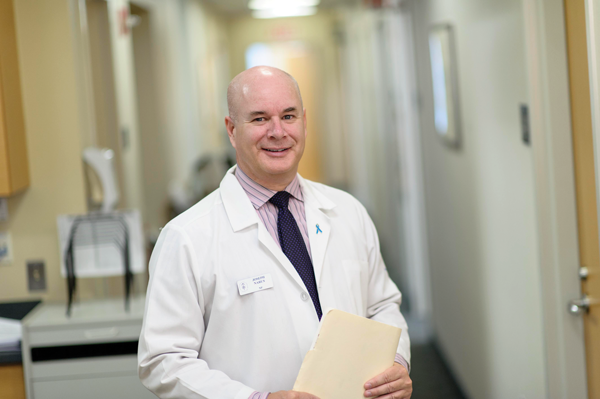Men, Cancer, and Sexual Health
by Joseph B. Narus, DNP, GNP-BC, ANP
Incredible advances in cancer care are now allowing men to recover healthy and active lives after treatment. Still, cancer treatments can affect a man’s sexual function. This is especially true for prostate, colorectal, and bladder cancers, three of the most common cancers in men. The side effects of surgery, radiation, and chemotherapy for these and other types of cancer can interfere with your ability to achieve and maintain an erection, lessen your desire for sex, and affect your ability to have children.
Sex is a wonderful and fulfilling part of life. Therefore, comprehensive cancer recovery should also include recovery of sexual health. However, many men are reluctant to discuss sexual side effects with their doctors, and clinicians may not bring up the subject. It is important to talk to your doctor about your sexual health and
discuss the potential sexual side effects of your cancer treatments.
A number of sexual side effects can occur as a result of cancer treatment, including the following:
- erectile dysfunction, or the inability to have or keep a rigid erection
- loss of sexual desire
- delayed, absent, or painful orgasm
- sexual incontinence, or urine leakage when you become aroused or have an orgasm
However, medications and devices are available that can help improve your sex life. Let’s take a closer look at these sexual side effects and discover some things you can do to treat or manage them.
Erectile Dysfunction
Medications and devices are available that can help improve your ability to get an erection. Your best choice should be based on your own personal satisfaction with the particular method, how it affects your quality of life, the risks and benefits of the treatment, and the cost of the treatment. FDA-approved interventions for erectile dysfunction include oral erectile medications, as well as penile vacuum devices, injections, suppositories, and implants. Your response to these interventions will depend on the cancer treatment you received, as well as how far along you are with your recovery.
Low Sexual Desire
When a testicle is removed or injured due to surgery, radiation, or chemotherapy, your testosterone level can be affected. Testosterone is the male hormone that influences your desire to have sex. Your testosterone levels can also decrease with cancer treatments that damage the pituitary gland. Testosterone replacement therapy with topical gels, injections, or pellets placed under the skin can improve these low levels and lead to increased sexual desire.
Many men are reluctant to discuss sexual side effects with their doctors, and clinicians may not bring up the subject.
Orgasm Difficulties
Delayed, absent, or painful orgasm caused by surgery to the genital or pelvic area or by chemotherapy is treatable. Although you will not ejaculate seminal fluid after prostate surgery or radiation therapy, you can still have the sensation of an orgasm. Don’t be embarrassed to discuss these orgasm changes with your doctor, as treatments are available that can help.
Sexual Incontinence
This side effect is common after pelvic cancer surgery to remove the prostate or bladder. There are two types:
- arousal incontinence – urine leakage that occurs as you are getting an erection
- orgasmic incontinence – urine leakage that occurs when you have an orgasm.
You and your partner may be surprised when sexual incontinence happens. However, rest assured that it can improve or completely stop as you recover. Practicing regular Kegel exercises (squeezing the pelvic floor muscles), as well as using a condom or a penis constriction ring during sex, can help limit urine loss during sex. It is also important to urinate before attempting sex and to limit caffeine and alcohol use, as these can worsen leakage. A surgical procedure implanting an artificial urinary sphincter is also an option if other treatments don’t help.
If you are currently experiencing cancer-related sexual dysfunction, don’t lose hope. A healthy sex life after cancer should be part of your full recovery. Make sure to talk to your cancer care team about how your cancer treatment will affect your sexual function and what can be done to manage the sexual side effects of treatment.
Dr. Joseph Narus is a nurse practitioner in the Male Sexual and Reproductive Medicine Program at Memorial Sloan Kettering Cancer Center in New York, NY. He also manages the MSKCC Penile Rehabilitation Program, treating sexual dysfunction after cancer treatment. With a clinical and research focus on male sexual health following cancer treatment, Dr. Narus has authored and co-authored multiple peer-reviewed articles and abstracts on sexual health and cancer, and he regularly speaks at local and national conferences about this area of survivorship.
This article was published in Coping® with Cancer magazine, March/April 2016.


